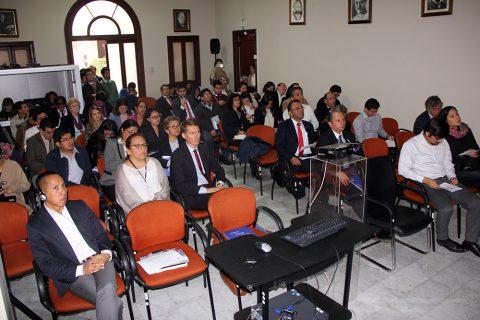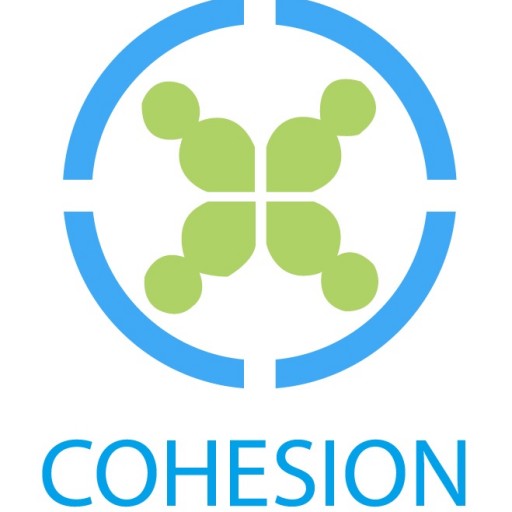The CRONICAS Center of Excellence in Chronic Diseases is sharing knowledge, building capacity and mutual understanding of health Policy and Systems Research.
Given the growing emphasis on health systems research and the role of health policy in the health of populations, the Peruvian team of COHESION, CRONICAS recently held a seminar on the topic.
Here is an overview of what took place and what the main and most important messages were:
On July 03 2017, the Institute of National Health (INS) and CRONICAS Center of Excellence in Chronic Diseases with the support of The Alliance for Health Policy and System Research- WHO, held the seminar “Health Policies and Systems Research” at the headquarters of the INS. The objective was to show and discuss a new area of research that can be used for the implementation of policies.
Dr. Hans Vasquez from the “General office of Research and Technology Transfer” opened the seminar and stressed the importance of moving forward from diagnostic research to doing research that can have a bigger impact on health. In countries like Peru there is little research on policies, health systems or implementation.
The first presentation was provided by Nhan Tran, manager of “The Alliance for Health Policy and Systems Research (AHPSR)”. He said that the current challenge is to ensure health interventions are effectively integrated into health systems and are designed to be scaled up in different contexts. He pointed out that one of the reasons why implementation is so difficult is because implementation is about change (asking organizations to behave differently, people to do things differently, etc.). That is why it is important to think implementation as a process of change. Finally, he emphasized three main important shifts on how to do implementation: 1) applying a more systems perspective, 2) thinking about research as part of the implementation research, and 3) having local investment in implementation.

(Left to right Dr. Hhan Tran and Dr. Hans Vásquez; picture from INS https://goo.gl/iwfkAt)
The next two presentations were from representatives of the public sector, Dr. Manuel Catacora Villasante from the “Institute of assessment in technologies in Health and Research” of the Social Security; and Bio Gisely Hijar Guerra from the “National Center of Public Health-INS”. They talked about the prioritized research subjects of their institutions, gave some examples of research being developed and pointed out some opportunities of funding.
The fourth presentation was given by Dr. Ludovic Reveiz from the Pan American Organization, where he explained how there is still too little information on how to do implementation research in policies. He showed the work the program iPIER is developing in Latin America and the Caribbean, which aims to facilitate improvements in program implementation through implementation research. An important part of this program is a workshop where the grant recipients receive a basic understanding of the research methodologies in implementation research.
The fifth presentation was from Dr. Fernando Llanos of the Universidad Peruana Cayetano Heredia. He talked about his research in health systems at primary care and universal coverage. He explained some conceptual frameworks, the methodology of the study and some final conclusions. He highlighted two important conclusions; first that before thinking in primary health care, there should be a clear definition of what is considered primary health care in Peru, and second, that talking about universal coverage meant to think of the system as a whole, because in the Peruvian context there are several subsystems.
Mg. Gerardo Seminario of “Salud sin Limites” gave the final presentation where he spoke about the process of making an agenda for public policies for the health of indigenous populations in Peru. He pointed out that a policy agenda is not necessarily a rational decision but derives from other factors like power roles, negotiations, institutional frames, etc. The making of an agenda consists on the concurrence of 4 factors: a problem, a possible solution, stakeholders and a window of opportunity. He concluded that the policies for the health of indigenous populations is still fragile, because the response for intercultural health is accepted but only on the surface, because the network of experts is not consolidated, because politicians change frequently as do their interests, because the vertical structure of the health system does not facilitate an intercultural health, and because the window of opportunities is narrowing.

(Picture from INS https://goo.gl/iwfkAt)
At the end of the seminar there were two panel discussions. One, about the priorities of research policies and health systems, included the participation of Dr. Maria del Carmen Calle Dávila (General Directorate of Strategic Interventions in Public Health) and Dr. Hans Vasquez (INS). The second panel was about funding opportunities for research in policies and health systems, and included Dr. Franco Romani (INS) and Dr. Alexander Tarev (General Directorate of Strategic Interventions in Public Health). The discussions brought to our attention the efforts of the public sector to do research, and though these efforts are few and recent, the road is being build. There is still the need that the research community meets the demands of the public sector. In that sense it is necessary that the public sector opens more opportunities where policy makers and researchers can encounter each other.
This seminar was a good opportunity for the dialog between the research community, policy makers and civil organizations. For the COHESION team, it was a good moment for engagement and to gain an update of the research being done in in health policies and systems.
CRONICAS and Health Systems Research:
At CRONICAS Center of Excellence in Chronic Diseases there have been past and ongoing research projects related to the assessment of health systems. Through 2012-2013 the project “Barriers” financed by the AHPSR, piloted for the first time in Peru a research implementation manual for the evaluation of healthcare systems’ responses to chronic non-communicable diseases. Currently the COHESION project has as objective to improving the health system response for attending the double burden of Noncommunicable and Neglected Tropical Diseases. Initiatives like these are in the path to look for solutions for the current health issues the health systems face.
Additional information:
- Peters, D. H., Tran, T. T., & Adam, T. (2013). Investigación sobre la implementación de políticas de salud: guía práctica. Alianza para la Investigación en Políticas y Sistemas de Salud. who.int/alliance-hpsr/…/Implementation_Research_SP.pdf
- World Health Organization. (2017). World report on health policy and systems research. http://apps.who.int/iris/bitstream/10665/255051/1/9789241512268-eng.pdf?ua=1&ua=1
- Gilson, L., & World Health Organization. (2013). Health policy and system research: a methodology reader: the abridged version. World Health Organization. http://www.who.int/entity/alliance-hpsr/resources/alliancehpsr_abridgedversionreaderonline.pdf?ua=1
